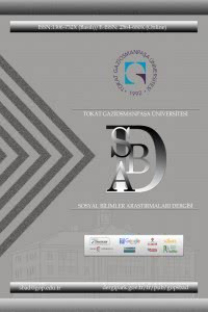VERİ MADENCİLİĞİ İLE HAVA YOLU MÜŞTERİ DEĞERLENDİRMELERİNİN ANALİZİ: BİR KARAR AĞACI ALGORİTMASI ÖRNEĞİ
Veri Madenciliği, Karar Ağaçları, Hava Yolu, Bilgi Kazancı, Türk Hava Yolları
ANALYSIS OF AIRLINE CUSTOMER ASSESSMENTS THROUGH DATA MINING: AN EXAMPLE OF DECISION TREE ALGORITHM
Data Mining, Decision Trees, Airline, Information Gain Ratio, Turkish Airlines,
___
- Alexa, https://www.alexa.com/siteinfo/tripadvisor.com#section_traffic, Erişim Tarihi: 02.05.2020
- Aydilek, İ. B. (2018). Yazılım hata tahmininde kullanılan metriklerin karar ağaçlarındaki bilgi kazançlarının incelenmesi ve iyileştirilmesi. Pamukkale Üniversitesi Mühendislik Bilimleri Dergisi, 24(5), 906-914.
- Barros, R. C., De Carvalho, A. C. ve Freitas, A. A. (2015). Automatic design of decision-tree induction algorithms. Springer International Publishing.
- Budak, İbrahim (2021). Veri ve Metin Madenciliği ile Hava Yolu İşletmelerinin Sosyal Medya Yorum ve Skorlarının Değerlendirilmesi, Pamukkale Üniversitesi Sosyal Bilimler Enstitüsü Yayımlanmamış Doktor Tezi, Denizli
- Cheng, C. P., & Chen, Q. (2010). Research of Applying the Method of Decision Tree Based on Information Gain Ratio to College Student's Employment Forecasting. Computer Simulation, 299-302.
- De Mántaras, R. L. (1991). A distance-based attribute selection measure for decision tree induction. Machine learning, 6(1), 81-92.
- Doğan, S. Z., Arditi, D., & Murat Günaydin, H. (2008). Using decision trees for determining attribute weights in a case-based model of early cost prediction. Journal of Construction Engineering and Management, 134(2), 146-152.
- Ghasemi, F., Neysiani, B. S., & Nematbakhsh, N. (2020, April). Feature Selection in Pre-Diagnosis Heart Coronary Artery Disease Detection: A heuristic approach for feature selection based on Information Gain Ratio and Gini Index. In 2020 6th International Conference on Web Research (ICWR), 27-32. IEEE.
- Gong, F., Jiang, L., Zhang, H., Wang, D., & Guo, X. (2020). Gain ratio weighted inverted specific-class distance measure for nominal attributes. International Journal of Machine Learning and Cybernetics, 1-10.
- Grąbczewski, K. (2014). Meta-learning in decision tree induction (Vol. 1). Springer International Publishing.
- Hall, M. (2006, December). A decision tree-based attribute weighting filter for naive Bayes. In International Conference on Innovative Techniques and Applications of Artificial Intelligence. 59-70. Springer, London.
- Hayamin, P., & Srivihok, A. (2018). Segmentation of Domestic Tourist in Thailand by Combining Attribute Weight with Clustering Algorithm. Journal of Advances in Information Technology Vol, 9(2), 39-44.
- Karegowda, A. G., Manjunath, A. S., & Jayaram, M. A. (2010). Comparative study of attribute selection using gain ratio and correlation based feature selection. International Journal of Information Technology and Knowledge Management, 2(2), 271-277.
- Pal, M., ve Mather, P. M. (2003). An assessment of the effectiveness of decision tree methods for land cover classification. Remote sensing of environment, 86(4), 554-565.
- Rizka, A., Efendi, S., & Sirait, P. (2018). Gain ratio in weighting attributes on simple additive weighting. MS&E, 420(1), 012099, 1-7.
- Shouman, M., Turner, T., & Stocker, R. (2011, December). Using decision tree for diagnosing heart disease patients. In Proceedings of the Ninth Australasian Data Mining Conference-Volume 121. 23-30
- Singer, G., Anuar, R., & Ben-Gal, I. (2020). A weighted information-gain measure for ordinal classification trees. Expert Systems with Applications, 113375, 1-14.
- TripAdvisor, https://www.tripadvisor.com/, Erişim Tarihi: 02.05.2020
- Win, T. Z., & Kham, N. S. M. (2019, February). Information gain measured feature selection to reduce high dimensional data. Seventeenth International Conference on Computer Applications (ICCA 2019), 68-73. Wu, J., Wang, J., Han, J., Peng, H., & Lu, J. (2013, August). An anonymized method for classification with weighted attributes. In 2013 IEEE International Conference on Signal Processing, Communication and Computing (ICSPCC 2013), 1-5. IEEE.
- ISSN: 1306-732X
- Yayın Aralığı: 2
- Başlangıç: 2006
- Yayıncı: Gaziosmanpaşa Üniversitesi Sosyal Bilimler Enstitüsü
İNGİLTERE’NİN YÜN İMPARATORLUĞUNA DÖNÜŞME SÜRECİ: III. EDWARD’IN YÜN POLİTİKASI
Tolgahan KARAİMAMOĞLU KARAİMAMOGLU, Sultan GÜRSOY
Yazılı Kaynaklar Işığında Parion'da Tapınım Gören Kültler
İKLİM DEĞİŞİKLİĞİ İLE MÜCADELEDE TÜRKİYE İÇİN KARBON VERGİSİ ÖNERİSİ
Işıl F. Orkunoğlu ŞAHİN, Taha Emre ÇİFTÇİ
COVİD-19 PANDEMİ SÜRECİNDE KADINLARIN EV İÇİ YÜKÜMLÜLÜKLERİ
SWARA VE MAIRCA YÖNTEMLERİ İLE BANKACILIK SEKTÖRÜNDE PERSONEL SEÇİMİ
Ayşe Elif YAZGAN, Halima AGAMYRADOVA
DÜŞMANLARIN NEZAKETİ ROMANINDA SİYASAL İSLAM/OFOBİ
BULANIK AHP VE TOPSIS YÖNTEMLERİNİN YÖNETİCİ SEÇİM PROBLEMİNE UYGULANMASI
İZMİR SPOR TARİHİ İÇİN YENİ BİR BELGE: İZMİR İDMAN YURDU NİZAMNAMESİ
